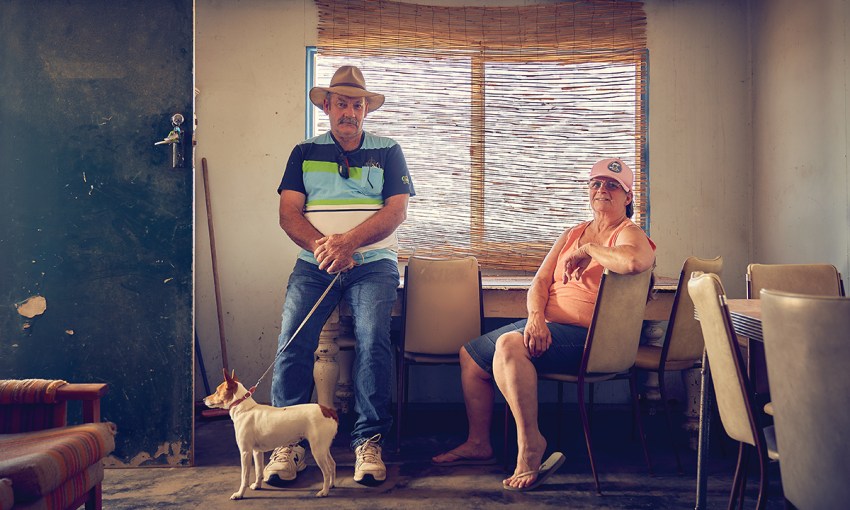The walls of the old corrugated iron shacks at Black Point are soaked with the memories of summers past. But these rustic beach houses are gradually being demolished, marking the end of an era for many families who’ve been coming to this picture-perfect bay for generations.
Sand castles: Black Point’s famous shacks
The crescent-shaped bay of Black Point is one of the most prestigious stretches of coastline in the state.
This 2.5 kilometres of sea and sand is a haven for the lucky few who have been able to secure their patch of peninsula paradise.
These days, the Black Point holidaymakers can generally be divided into two camps: The “townies” who have bought land in more recent times and built large, luxurious holiday homes around the bay; and the original “Blackie shackies”, many of them farming families, who have been making the seasonal trek to this foreshore for decades. Many of these families own the old, original shacks on the waterfront that stand like monuments to days gone by; fibro, tin and timber tributes to simpler times.
But these shacks, and the history and heritage they hold, are gradually being lost, demolished one by one due to the ravages of time and development laws.
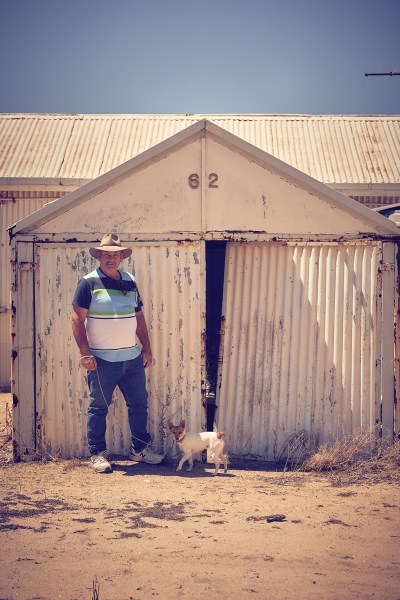
According to a spokesperson from the Department for Environment and Water: “Any shack that is on Crown land that was either converted to a fixed term lease voluntarily by the original life tenant, or has become a fixed term lease due to the life tenure entitlement and freehold land being sold has to be removed by 30 June, 2037.”
Those with freehold titles must demolish their shacks by 2037, but can build new holiday homes on land they’ve purchased further back from the beach; “behind the line”, as the locals refer to it. This means the northern or seaward boundary of their freehold site. The Crown land then reverts to public foreshore land. So, the line in the sand has been drawn at this idyllic holiday spot – quite literally – and the old shacks will gradually disappear in coming years. SALIFE spoke to some of the Black Point families about their holiday homes in this special slice of South Australia, and the rustic appeal of these precious shacks by the sea.
“Our shack itself was the old Wheat Board office in Kadina”
David Linke was about five years old when his family first established their Black Point shack.
Today, almost 60 years later, the affable farmer enjoys time at the shack with his family, while still running the farm in Sandilands with his son Edward.
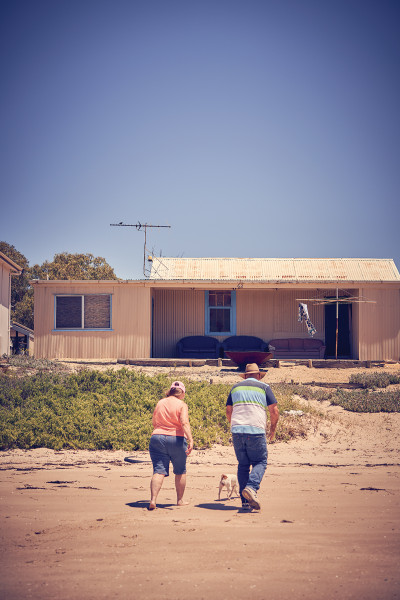
But David admits he’s a tad bemused by all the development and building around the picturesque bay in recent years.
“It’s progress, I suppose, but it makes me laugh a bit because they came over to the country to get away from the hustle and bustle of suburbia and all they want to do now is make it into suburbia,” he says. “That’s just the way it is, I suppose.”
The Linkes have a long association with Black Point. David’s father Ron levelled out a lot of the blocks with his bulldozer in the 1950s, and their family shack started out as a shed in the 1940s down near the boat ramp.
“My father and grandfather Eddie used to camp in there, and back then there were only about five sheds on the beach,” he says.
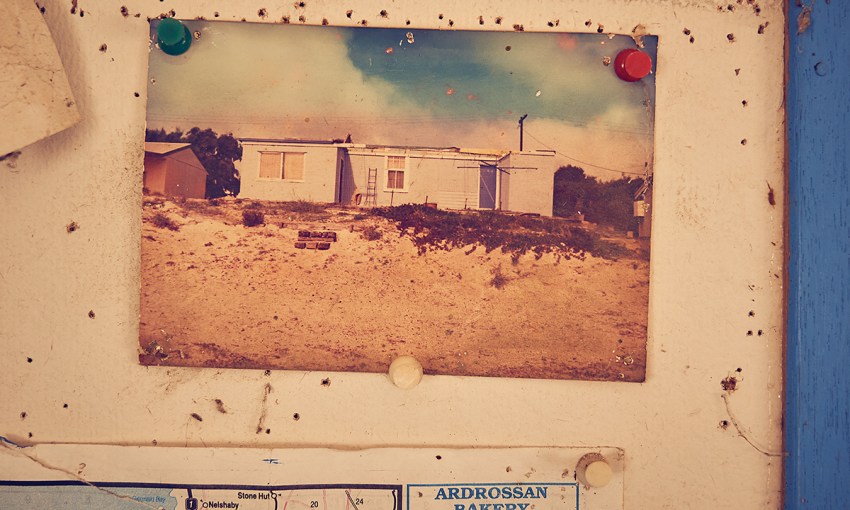
“Our shed was then towed up the beach in 1962 and put on the site of our shack now. It’s come to the point now where she’ll have to be demolished; she’s a bit of a wreck.
“Our shack itself was the old Wheat Board office in Kadina. My father and grandfather moved it to Black Point on the back of our truck and trailer. There are stories like that right throughout this area.
“Ours is one of the originals and within the first two years of setting it up we put in a kitchen, bathroom and a verandah, but the rest is exactly as we put it here.”
David recalls the fun of being a kid and being sent by his mum Margaret to buy bread and milk from the old kiosk at the end of the beach. “It was a real meeting place for all us kids and we’d buy those terrible Wizz Fizz things,” he says.
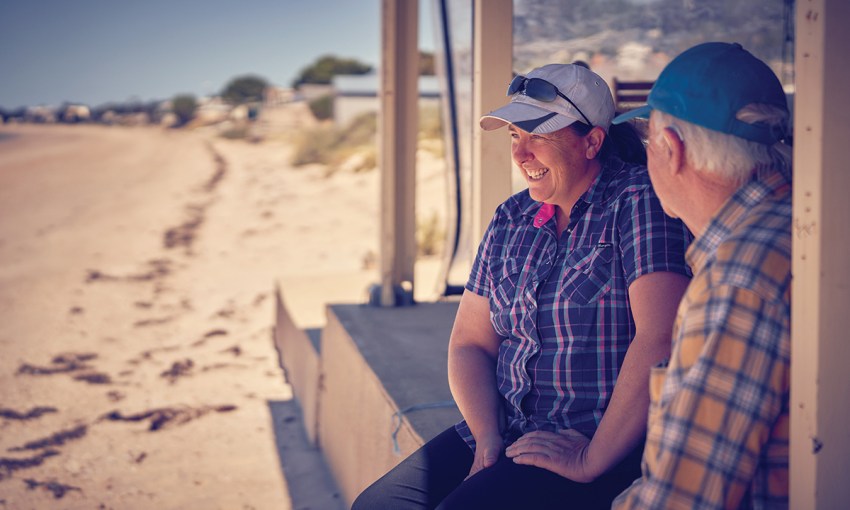
“There were fuel pumps there too and it was all run by the Pine Point shop.”
Holidays with his sisters Maree and Jennifer were spent swimming, fishing, snorkelling, waterskiing and body-boarding.
During the past 25 years, David and his wife Marie have enjoyed Black Point holidays with their children Rebekah, now 24, Edward, 22 and Stephanie, 20.
“They learnt all the ins and outs of the sea and the dangers of it, because this is a very safe bay, protected from the south-easterlies and there aren’t a lot of northerlies, although we do get some,” he says.
“Years ago, we had a club, the Yorke Peninsula Sail Board Club, with about 35-strong membership. We would race every second Sunday right throughout the year.
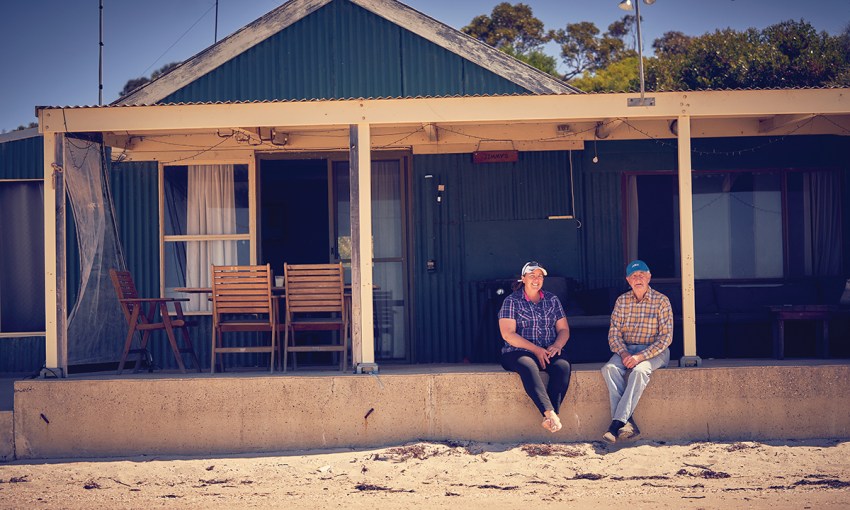
“We’d race windsurfers, it was a bit of a fad back then, but we all got too old.”
When David describes lazy days at the shack these days, there is a strong sense of stress-free, relaxing times where deadlines disappear.
“Tea is any time between 7pm to 10pm because time just runs away here,” he says. “Kids come in and go and you don’t know who you’re feeding, people roll up and talk and drink and do activities on the beach and in the water.
“It’s all very relaxed. Put it this way, you don’t have to wipe your feet when you go into the shack, and when the sand dries you sweep it all out the door. Some of the lovely shacks down here now, you’ve got to have a shower before you go inside.”
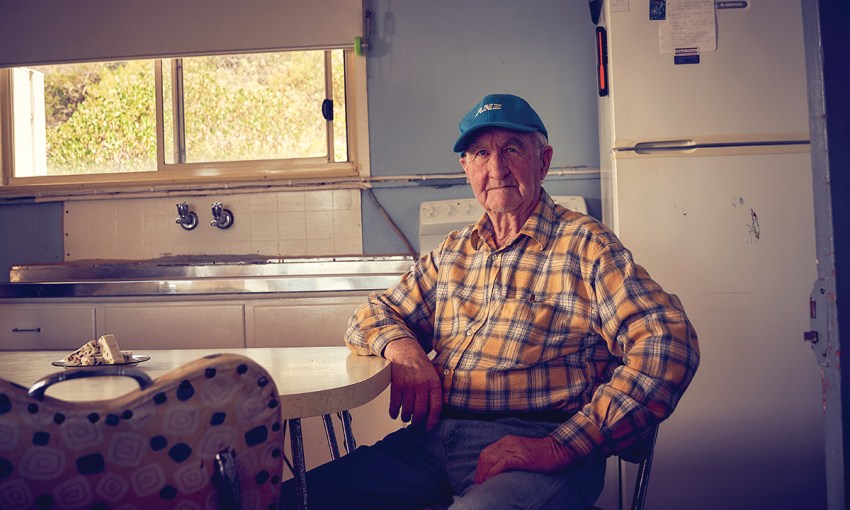
David believes Black Point was more family orientated in years gone by, but the bay has seen an influx of retirees in recent times.
While he loves the old Linke shack, David is aware that they will need to knock it down and build something new and modern before too long.
“But we’ll have to move back behind the line,” he says. “At the moment our shack is on half lease and half freehold.
“There comes a time when you really have to let go of the old, but it won’t be easy. We used to have Christmas down here as kids with my father’s uncles and aunties and all their kids and there are a lot of memories in that. And we’ve got all the memories with our kids, but I guess at some stage you’ve got to move on.”
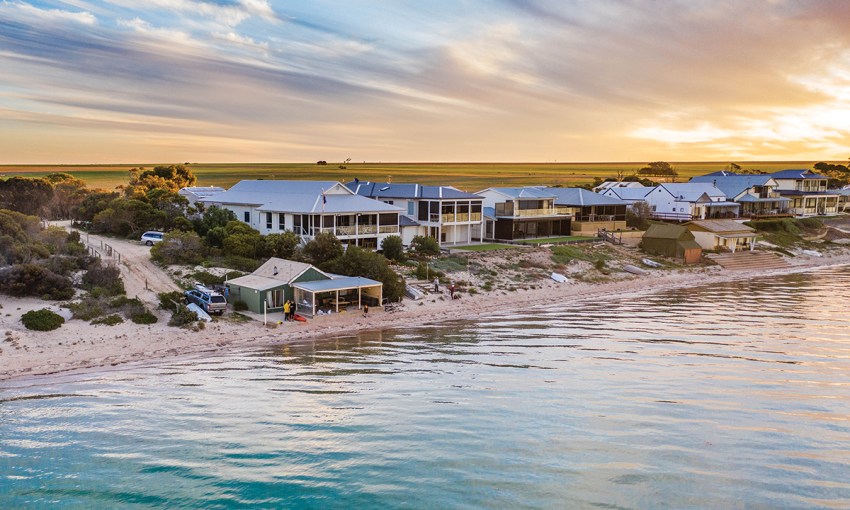
“It is such a big part of your life growing up and you want to give your kids that experience”
When Sheree Brennan describes her childhood memories of her family’s shack, you can almost feel the sea breeze, the hot sand and the cool waters of Black Point. Sheree’s family has enjoyed this pristine piece of coastline since shacks first appeared here in the 1950s.
“My earliest memories of Black Point are that it was where we learnt to swim and it was also where we went after school when it was hot,” Sheree says.
“Mum would intercept the school bus at Pine Point and pick us up and we would go for a swim.”
The family’s old corrugated iron and timber shack was built by Sheree’s grandfather Laurence Henry Stock and has been in the family for four generations.
“They weren’t designated dwellings in the 1950s,” Sheree says. “Our shack was one of the first few structures on the beach – and when I say ‘structure’, they were basically sheds, somewhere to store your boat and shelter.
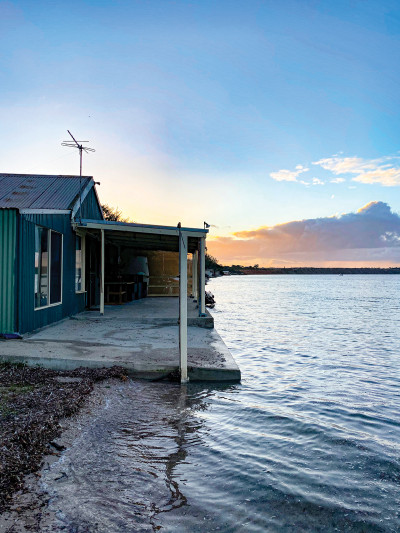
“We were lucky though as the toilet was built inside the shed, so we didn’t have to trudge up the hill to an outside toilet. We thought we were pretty posh with an inside toilet.”
The family has since added bedrooms and a boat shed to the property but, in essence, the shack stands as it was 70 years ago.
Sheree recalls the lead up to the traditional summer holidays at Black Point with her parents Patricia and Henry James Stock, and siblings Darren, Alison and Robin.
“It was the same every year,” she says. “We would always spend Christmas Day on the farm then, come Boxing Day, we would all pack up and head to the shack.
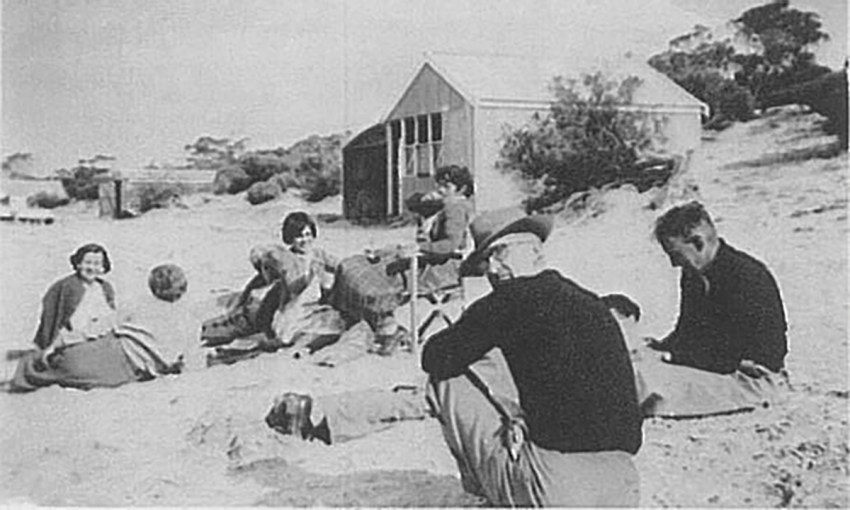
“I would look forward to the Black Point summer holidays all year and I was always the first one packed. We were also there every Easter and the October school holidays, but summer was the big one.”
Sheree’s love of the area is so strong that the 46-year-old photographer gave up a career overseas to be closer to it.
Having worked in tourism for many years, including in Africa, the Northern Territory and a decade in Europe, Sheree and her husband Craig moved back to Yorke Peninsula in 2017 so they could spend more time at Black Point.
“Every beach, whether it was the Mediterranean or some fancy beach somewhere, it didn’t matter; I would always say, ‘It’s not as good as Black Point’. When people hear about my life overseas, they say, ‘And you moved back to Maitland?’ And I say, ‘Yes, because it’s Yorke Peninsula and it’s beautiful’.
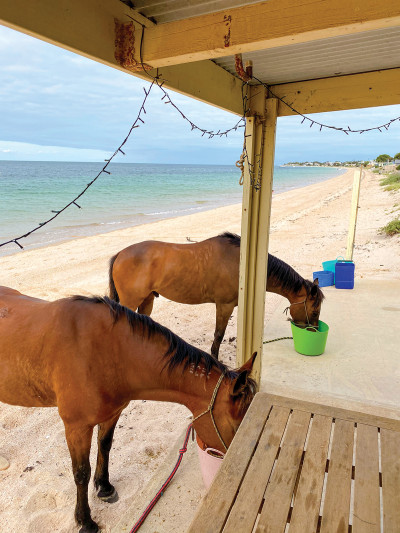
“We moved back to the area because we missed the shack and we wanted to use it more. It is such a big part of your life growing up and you want to give your kids that experience as well.”
Sheree’s children, Maireade, 19, and Rory, 17, have been coming to the family shack since they were born and the daily holiday routine is the same as when their mum was a girl.
There is usually a swim in the morning, then a game of beach cricket or a walk, then a game of cards or watching the cricket on TV in the heat of the day, then another swim later in the afternoon.
“There were always those friends who you caught up with once a year. You only ever saw them at Black Point, but when you saw them, they were your best buds again; you were shack friends,” says Sheree, who now works around the Yorke Peninsula as a photographer for the real estate industry.
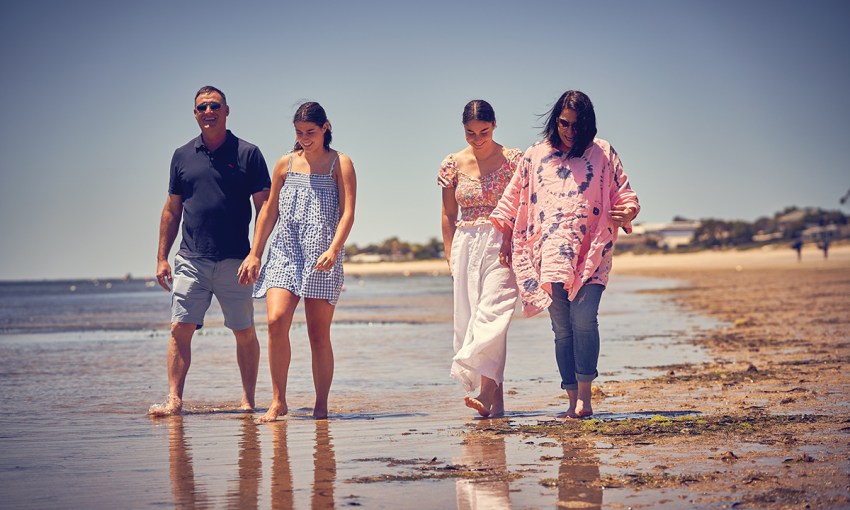
“When I was a kid, a lot of people here had boats but we didn’t need toys; jet skis and all that. You literally went to the beach and swam. You chucked a tennis ball around and you played beach cricket out the front when the tide was out.”
They are simple pleasures that still apply today. The mod cons are missing – but not missed. Sheree says in severe heat you can only sit in the shack’s main room as the others aren’t insulated – it’s just corrugated iron – but that’s part of the old-world appeal. A highlight for her is taking her horses, Jack and Hunter, for a run and a swim at Black Point.
“It’s one of the most beautiful beaches for horses to swim at because they can get quite deep quite quickly,” Sheree says.
“I tie them up at the verandah of the shack and they just chill out. They love it here. If I’m down the beach my horses are with me.”
Sheree says the most incredible and enjoyable aspect of a holiday at the shack is the ability to simply shut down.
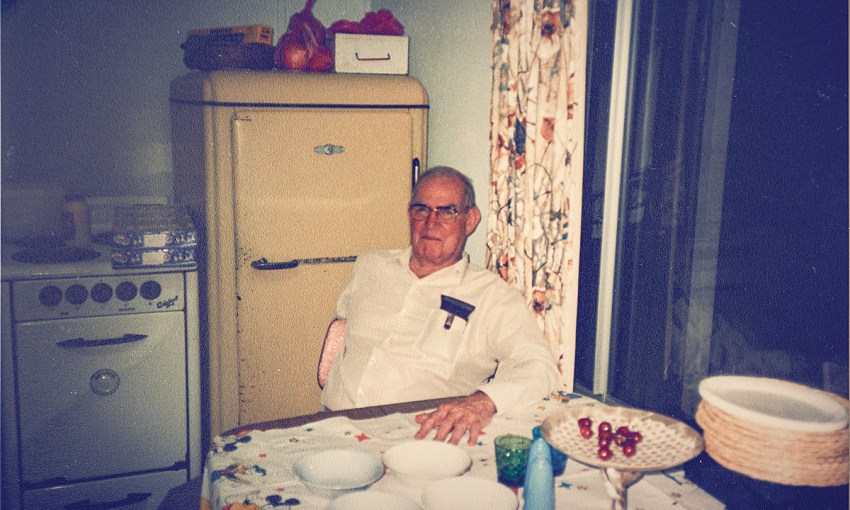
“There is no infrastructure here; no pubs, no shops. But you don’t go to Black Point to go out for dinner or go shopping or buy curios, you go to Black Point to stop, and I think that’s why people love it,” she says.
“Black Point is so different because you are on the beach the whole time and you can get out of your car and, as long as you have an esky and the fridge is full, you don’t need to leave for a week. In fact, you curse yourself every time you have to walk up that hill.”
Sheree’s family has a life tenure on the property – the tenure will finish when the last remaining name on the tenure passes away (Sheree’s name) and she is not able to transfer it to her children.
“If you are lucky enough to own one then great, but I think we should all be considered custodians of these shacks; that’s how I see us,” says Sheree
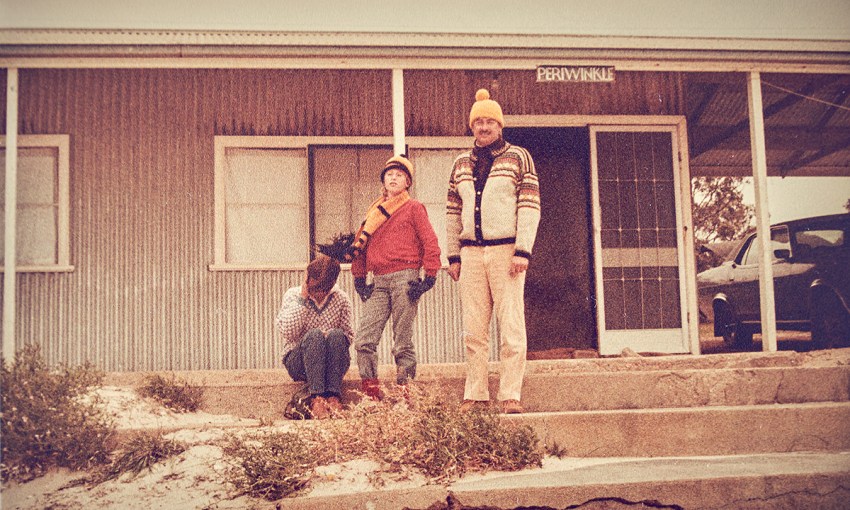
“These beauties are dwindling year by year and it upsets me that they are gone and there is so much history and heritage that has just literally been demolished.
“I’m involved in the National History Trust of SA and I think it is just such a shame, however I’m just so grateful that ours will get to stay for much longer.
“I have no problem with progress and development and building things, but what bothers me the most is that a lot of people who’ve built these big beach houses at Black Point don’t use them, they just rent them out. Our shack is always in so much demand, I think mainly because it’s just simple, and it’s in a prime position with the water lapping at the verandah. It’s what people actually come here for.
“Who wants to go to the beach and have six bedrooms and four bathrooms to clean? That’s a bit sterile for me. We are very happy with our shack and the memories we have created here and will continue to create. I just have to stay alive long enough for all my family and their family to enjoy the place. Given the relaxed life we have here, that remains a possibility.”
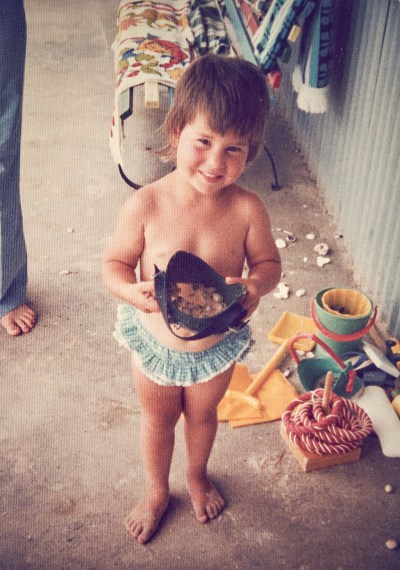
“You had to explain it was between Ardrossan and Port Vincent and people would say, ‘Where’s that?’.”
Hilary Ferguson tells the story of her great grandfather Basil Henderson with his wife Dorothy camping at Black Point in the 1930s with their eight children. “They’d sleep in the sand dunes,” she says.
“Back then, there were a couple of fishing shacks and that was about it and then they opened it up and my grandpa, John Hill, and these other four men were on the council and they thought, ‘This looks like a good spot’, so they built five shacks in a row.
“They were all exactly the same; no mains water, no power, just tin sheds basically.”
Hilary’s mother Anne ended up inheriting that shack and Hilary remembers many summer holidays by the sea when she was a child.
“There was still no water,” she says. “We used to have to cart water if we ran out of rainwater, but there was electricity by then.
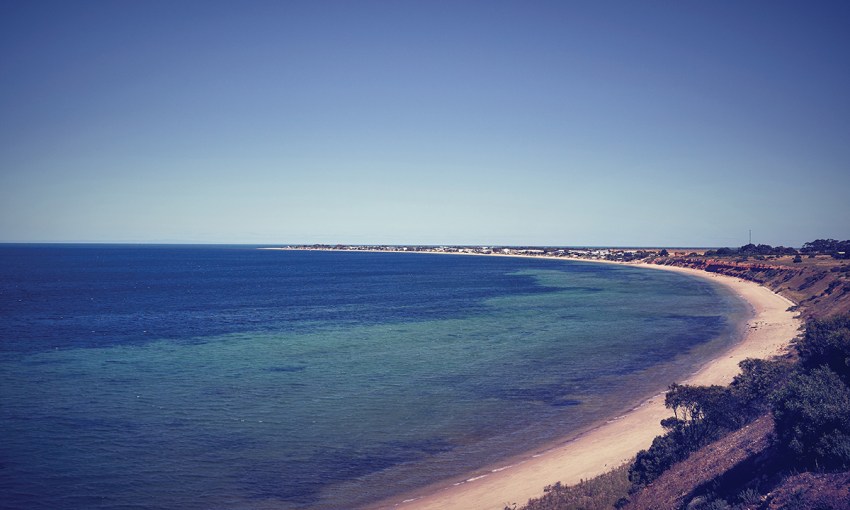
“But they were great holidays as kids. We did heaps of swimming, diving, and fishing, we’d bag out on scallops” she says.
“We also used to sail on a friend’s catamaran, we had bonfires on the beach. It was really easy and our parents didn’t worry about where we were. We’d be at someone else’s shack and we’d just wander around outside from morning till night. At the time, it felt like summer holidays went on forever.”
Hilary also has memories of a little kiosk at the end of the beach, a tiny branch of the Pine Point shop, where she’d be sent to get the newspaper, bread and milk.
“But you were always allowed to get a few lollies and that was a highlight for us because we grew up on a farm and we couldn’t run to the local shop to get lollies. It was very cool,” she says.
Hilary’s parents ended up building a new shack, just back from the site of the old one, and the extended family have continued to share times in the new abode on the waterfront.
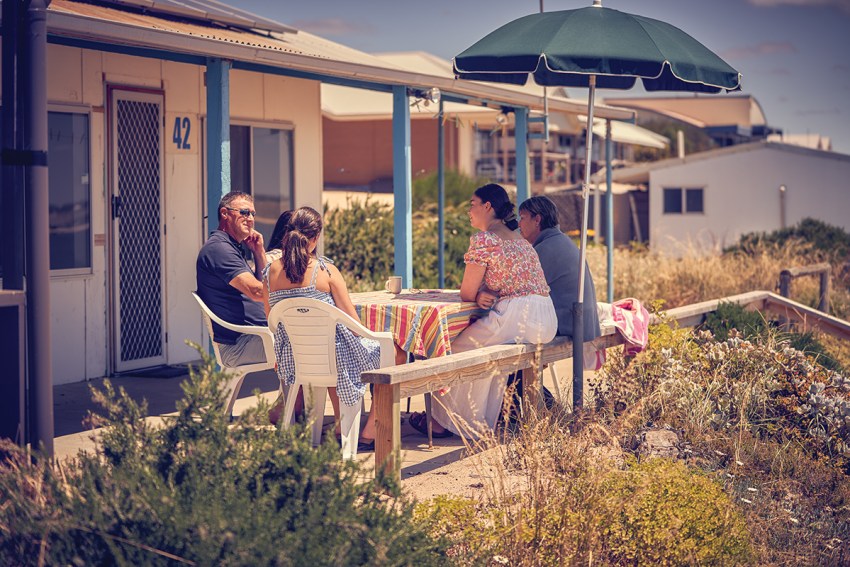
Then, in 2016, the old shack next door, owned by Black Point identity Bob Perry and his wife Heather, hit the market and Hilary and her husband Rob Heaslip snapped it up.
“We’d been good friends with Bob and Heather for many years,” Hilary says. “When his shack came up, we thought it was a great opportunity. So now, we are next to Mum and Dad and we have a new shack and an old one between us.”
Hilary and Rob, who run a farm in Huddleston between Crystal Brook and Gladstone, have enjoyed annual summer holidays at Black Point with their girls Grace, 20, and Alice, 17.
They own the freehold on the block behind their shack, so the old shack will eventually come down and a new one will go up.
“Basically, the front of our new shack will be level with the back of our old one,” Hilary says.
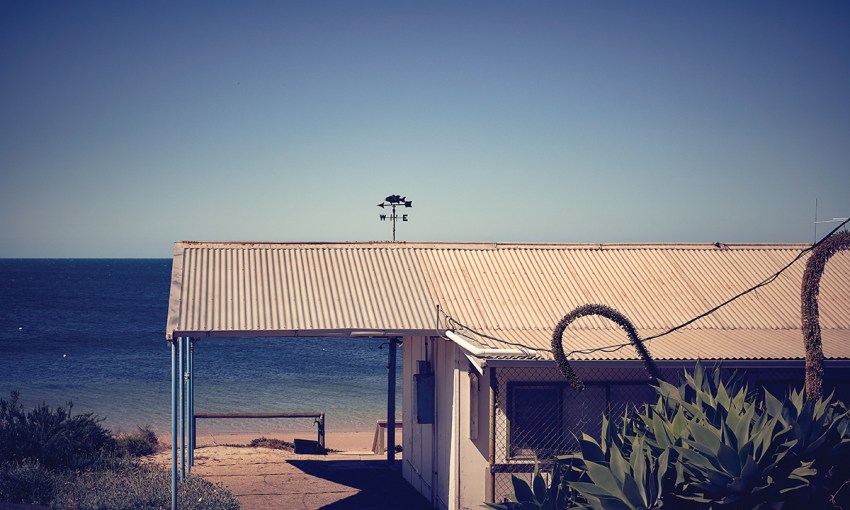
“The old shacks are too close to the high-water mark. This was all being worked out when I was young and it was a bit of a win for some shack owners who thought they were just going to have to knock them down and lose them. Eventually, it was agreed to allow shack owners to buy the freehold land behind.”
Hilary says when she was a girl many Adelaide people didn’t even know where Black Point was.
“You had to explain it was between Ardrossan and Port Vincent and people would say, ‘Where’s that?’,” she says.
“But if you know the location, you know it’s a really magical place.
“We always unwind when we go there and I think that’s because when the kids were young it was so safe. Just to be able to sit on the verandah and watch them swim and build sandcastles is pretty unbelievable.”
A particularly strong memory for Hilary is the regular seafood nights on the beach that Bob Perry and the shack-owners association used to organise in the late 1990s and early 2000s.
“Bob was a cameraman at Channel Nine for many years and he was mates with Michael Angelakis,” she says.
“They would put on a seafood night on the beach and you’d bring a salad and a seat and just sit around and you’d get seafood and chips; it was amazing.
“It was a great way to meet other people who had shacks, too. There have been so many good times here. We just love it.”
This article first appeared in the January 2022 issue of SALIFE magazine.



